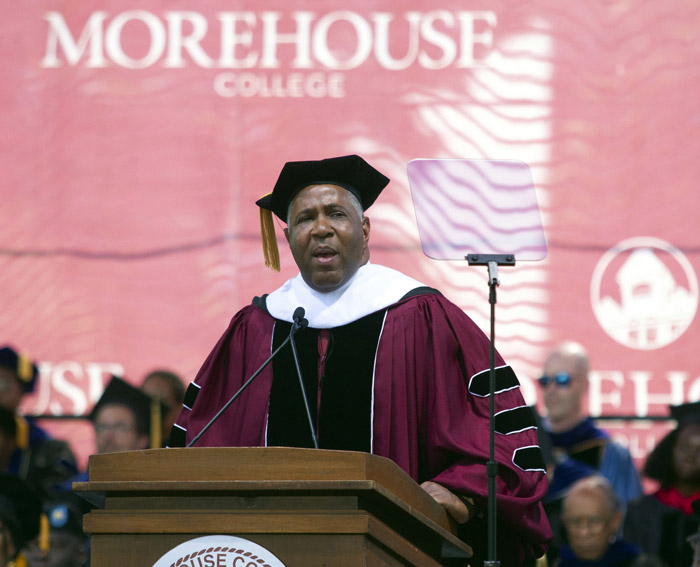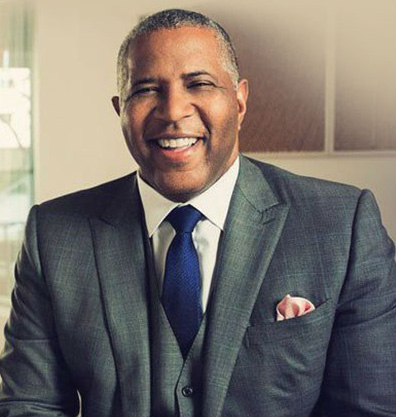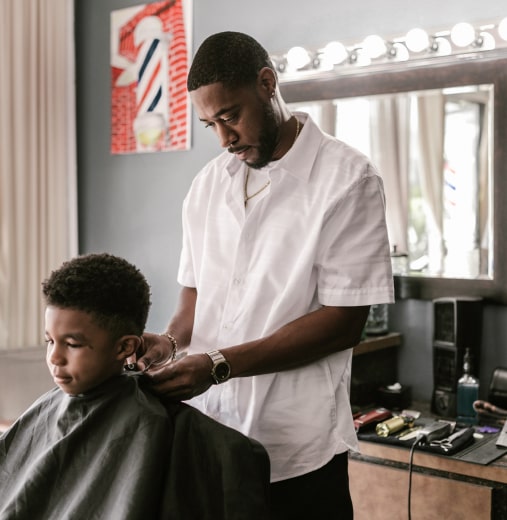Founder, Chairman and CEO, Vista Equity Partners
Engineer, business leader, entrepreneur and philanthropist Robert F. Smith co-leads Southern Communities Initiative (SCI). He currently serves as the Founder, Chairman and CEO of Vista Equity Partners (Vista), a leading global technology investor. Smith is also the founding director and President of Fund II Foundation and Chairman of Carnegie Hall and Student Freedom Initiative (SFI).
While he is widely known for his business prowess and success in the investment industry, he is just as passionate about philanthropy, especially creating opportunities for communities that often lack access to resources. Throughout his career, Smith has made financial contributions to several organizations and initiatives that support this mission.
Early Life and Career Path
Born to two educators in 1962 in Denver, CO, Smith developed a love and passion for learning. Throughout his formative years, Smith watched his parents work hard and dedicate themselves to noble causes. His mother donated $25 each month to the United Negro College Fund (UNCF) — no matter the family’s financial situation.
Smith took this drive and compassion with him as he went through the Denver public school system. While he was still in high school, he applied for an internship position at Bell Labs — a spot typically reserved for college students. Smith was originally rejected, but after months of persistence, he was given an opportunity to interview and was offered the position. He continued working at Bell Labs throughout his school breaks until he graduated in 1985 from Cornell University with a chemical engineering degree. He went back to school to pursue his MBA at Columbia Business School. After graduating with honors from Columbia University in 1994, Smith started working at Goldman Sachs.
After six years there, he established his own investment firm, Vista. Today, Vista invests in enterprise software businesses across private equity, private credit and permanent capital. The firm also has a dedicated Private Wealth Solutions team that works with financial advisors to provide eligible investors with the opportunity to invest in enterprise software.
In recognition of his professional achievements, Smith was listed among TIME100’s “Most Influential People” of 2020. He was also named one of Forbes’ 100 Greatest Living Business Minds in 2017, highlighting his leadership in private equity and his innovative approach to investing in enterprise software.
Philanthropy: Helping to Create a Better World
Smith’s charitable interests range from the arts and outdoors to education and technological development. In 2017, he signed the Giving Pledge, in which he committed to invest more than half of his net worth to charitable organizations during his lifetime.
Throughout his career, Smith has been widely recognized for his philanthropic work. In 2018, Smith received the Ronald H. Brown American Journey Award. The next year, he was honored with the Carnegie Medal of Philanthropy. Smith also received theGrio’s Philanthropy Icon Award in 2022 and the Legal Defense Fund’s National Equal Justice Award in 2023. In addition, he was honored with the Founders Award from Foster Love and George H.W. Bush Points of Light Award in 2023 and the Committee for Economic Development’s Distinguished Leadership Award in 2024.

“In 2017, he signed the Giving Pledge in which he promised to donate more than half of his wealth to charitable organizations during his lifetime.”
Expanding Opportunities for Education
As an avid philanthropist, Smith has been fully committed to his Giving Pledge commitment. Like SCI, Smith believes that education can offer the tools and infrastructure to help uplift individuals and entire communities. For example, he has personally gifted millions to fund scholarships at his alma maters, Cornell University and Columbia University.
Under Smith’s leadership, Fund II Foundation launched internXL in 2019. The platform is dedicated to creating career opportunities for students from communities that lack access to resources by matching them with paid internships at leading companies.
Smith announced in his 2019 commencement speech to the Morehouse College graduating class that he intended to eliminate their student loan debt. He later eliminated the student debt held by their guardians on their behalf, bringing the total of his gift to $34 million.
After witnessing how his donation financially liberated those students, Smith was inspired to do more. In 2020, Smith matched a $50 million donation from Fund II Foundation, which helped launch SFI. SFI is an organization that provides academic, professional and financial support to students pursuing STEM-related majors at participating Historically Black Colleges and Universities, other Minority Serving Institutions and Tribal Colleges and Universities. Ultimately, SFI aims to be a catalyst for freedom in professional and life choices for students by increasing social and economic mobility.

Smith’s Partnership With Southern Communities Initiative
When Smith first partnered with SCI, his goal was to help establish banking infrastructures in select Southern communities through locally led, measured and sustained initiatives. Under Smith’s leadership, SCI partnered with Regions Bank, Truist Foundation and The Studio @ Blue Meridian Partners to support Grameen America in its mission to empower female entrepreneurs. Specifically, they helped Grameen America open its first physical location in Atlanta through its Elevating Black Women Entrepreneurs initiative.
Learn about Smith’s connection with SCI by watching the video below.
Join Us and Get Involved!
If you’re interested in becoming a partner with Southern Communities Initiative or want to get involved with volunteering, we invite you to explore the different ways you can engage.




